
Iolanthe; or, The Peer and the Peri is a comic opera with music by Arthur Sullivan and libretto by W. S. Gilbert. It is one of the Savoy operas and is the seventh of fourteen operatic collaborations by Gilbert and Sullivan. In the opera, the fairy Iolanthe has been banished from fairyland because she married a mortal; this is forbidden by fairy law. Her son, Strephon, is an Arcadian shepherd who wants to marry Phyllis, a Ward of Chancery. All the members of the House of Peers also want to marry Phyllis. When Phyllis sees Strephon hugging a young woman, she assumes the worst and sets off a climactic confrontation between the peers and the fairies. The opera satirises many aspects of British government, law and society. The confrontation between the fairies and the peers is a version of one of Gilbert's favourite themes: a tranquil civilisation of women is disrupted by a male-dominated world through the discovery of mortal love.
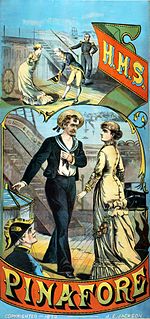
H.M.S. Pinafore; or, The Lass That Loved a Sailor is a comic opera in two acts, with music by Arthur Sullivan and a libretto by W. S. Gilbert. It opened at the Opera Comique in London, on 25 May 1878 and ran for 571 performances, which was the second-longest run of any musical theatre piece up to that time. H.M.S. Pinafore was Gilbert and Sullivan's fourth operatic collaboration and their first international sensation.
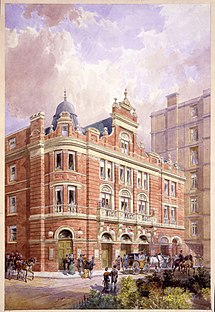
The Savoy Theatre is a West End theatre in the Strand in the City of Westminster, London, England. The theatre opened on 10 October 1881 and was built by Richard D'Oyly Carte on the site of the old Savoy Palace as a showcase for the popular series of comic operas of Gilbert and Sullivan, which became known as the Savoy operas as a result.
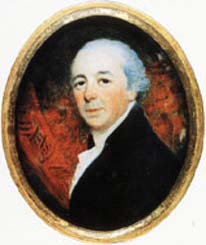
John Nash was one of the foremost British architects of the Regency and Georgian eras, during which he was responsible for the design, in the neoclassical and picturesque styles, of many important areas of London. His designs were financed by the Prince Regent, and by the era's most successful property developer, James Burton, with whose son Decimus Burton he collaborated extensively.

Utopia, Limited; or, The Flowers of Progress, is a Savoy opera, with music by Arthur Sullivan and libretto by W. S. Gilbert. It was the second-to-last of Gilbert and Sullivan's fourteen collaborations, premiering on 7 October 1893 for a run of 245 performances. It did not achieve the success of most of their earlier productions.

Persuasion is the last novel fully completed by Jane Austen. It was published at the end of 1817, six months after her death.
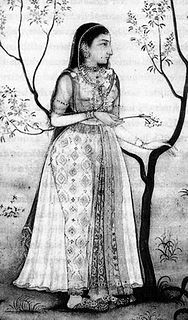
Jahanara Begum was a Mughal princess and the Padshah Begum of the Mughal Empire between 1631 to 1681. She was the eldest child of Emperor Shah Jahan and his wife, Mumtaz Mahal. Often referred to simply as Begum Sahib, she was also the older sister of the crown prince Dara Shikoh and Emperor Aurangzeb.
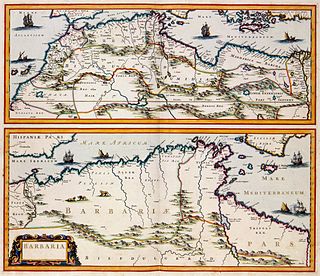
The Barbary pirates, sometimes called Barbary corsairs or Ottoman corsairs, were Muslim pirates and privateers who operated from North Africa, based primarily in the ports of Salé, Rabat, Algiers, Tunis, and Tripoli. This area was known in Europe as the Barbary Coast, a term in reference to Greco-Roman ''barbarian'' used by emerging Europeans powers to denote parts of Northern Africa plagued by constant Muslim pirates and privateers, who according to European standards at that time were far from the realm of civilization. Their predation extended throughout the Mediterranean, south along West Africa's Atlantic seaboard and into the North Atlantic as far north as Iceland, but they primarily operated in the western Mediterranean. In addition to seizing merchant ships, they engaged in Razzias, raids on European coastal towns and villages, mainly in Italy, France, Spain, and Portugal, but also in the British Isles, the Netherlands, and Iceland. The main purpose of their attacks was slaves for the Ottoman slave trade as well as the general Arab slavery market in North Africa and the Middle East. Slaves in Barbary could be of many ethnicities, and of many different religions, such as Christian, Jewish, or Muslim.

Ellen Jane Willis was an American left-wing political essayist, journalist, activist, feminist, and pop music critic. A 2014 collection of her essays, The Essential Ellen Willis, received the National Book Critics Circle Award for Criticism.
Mary R. Lefkowitz is an American scholar of Classics. She is the Professor Emerita of Classical Studies at Wellesley College in Wellesley, Massachusetts, where she previously worked from 1959 to 2005. She has published ten books over the course of her career.

Wimereux (Dutch:Wimeruwe) is a commune in the Pas-de-Calais department in the Hauts-de-France region of France.
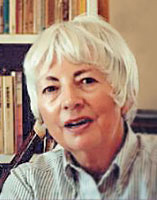
Dorothy Edith Gilman was an American writer. She is best known for the Mrs. Pollifax series. Begun in a time when women in mystery meant Agatha Christie's Miss Marple and international espionage meant young government men like James Bond and the spies of John le Carré and Graham Greene, Emily Pollifax, her heroine, became a spy in her 60s and is very likely the only spy in literature to belong simultaneously to the CIA and the local garden club.

Dame Bridget Cicely D'Oyly Carte, DBE, was the granddaughter of impresario Richard D'Oyly Carte and the only daughter of Rupert D'Oyly Carte. She was head of the D'Oyly Carte Opera Company from 1948 until 1982.

Helen Carte Boulter, also known as Helen Lenoir, was the second wife of impresario and hotelier Richard D'Oyly Carte. She is best known for her stewardship of the D'Oyly Carte Opera Company and Savoy Hotel from the end of the 19th century and into the early 20th century.

Yoga Vasistha is a philosophical text attributed to Valmiki, although the real author is Vasishta. The complete text contains over 29,000 verses. The short version of the text is called Laghu Yogavasistha and contains 6,000 verses. The text is structured as a discourse of sage Vasistha to Prince Rama. The text consists of six books. The first book presents Rama's frustration with the nature of life, human suffering and disdain for the world. The second describes, through the character of Rama, the desire for liberation and the nature of those who seek such liberation. The third and fourth books assert that liberation comes through a spiritual life, one that requires self-effort, and present cosmology and metaphysical theories of existence embedded in stories. These two books are known for emphasizing free will and human creative power. The fifth book discusses meditation and its powers in liberating the individual, while the last book describes the state of an enlightened and blissful Rama.

Sir John D'Oyly, 1st Baronet was a British colonial administrator.

Devī is the Sanskrit word for "goddess"; the masculine form is Deva. Devi – the feminine form, and Deva – the masculine form, mean "heavenly, divine, anything of excellence", and are also gender specific terms for a deity in Hinduism.

Sri Dalada Maligawa or the Temple of the Sacred Tooth Relic is a Buddhist temple in the city of Kandy, Sri Lanka. It is located in the royal palace complex of the former Kingdom of Kandy, which houses the relic of the tooth of the Buddha. Since ancient times, the relic has played an important role in local politics because it is believed that whoever holds the relic holds the governance of the country. Kandy was the last capital of the Sri Lankan kings and is a World Heritage Site mainly due to the temple.
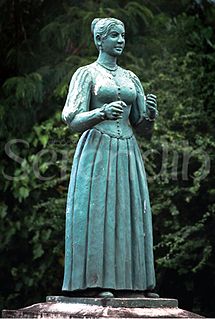
Donna Isabella Koraneliya was a Ceylonese author who was noted for having the ability to write and recite impromptu Sinhala poetry. She was born in Col, Ceylon as the second daughter of Don Francisco Senarathna Kumara Perumal and Francina Jasenthu Graivo. Gajaman was baptised as Donna Isabella Koraneliya. She had her early education within her own family. She was talented and earned her honorific name Gajaman Nona from her mother. She grew up in Matara, with a taste for dressing like a Dutch woman, which came from her partially 'Westernized' background. She had a surprising talent in literature, which was highlighted by the women of her community and status.

Maudie was a 4,661 GRT tanker that was built in 1920 by Lithgows, Port Glasgow, Scotland. Laid down as War Peshwa for the British Shipping Controller, she was completed as Maudie for a Norwegian company. In 1937, she was sold to Finland and renamed Angra. A further sale in 1942 saw her renamed Mercator.


















